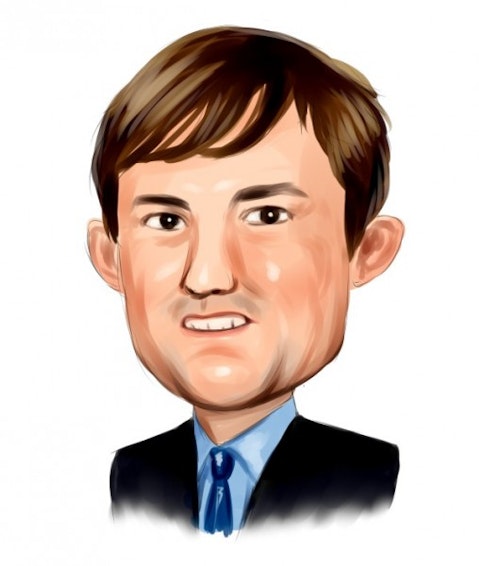Tiger Global Management LLC is a highly secretive hedge fund firm founded by billionaire Charles “Chase” Coleman in 2001. The $20 billion asset manager, which also holds stakes in private firms such as Indian e-commerce firm Flipkart and transportation service Uber Technologies, has recently undergone one of the biggest reorganizations since its foundation, as several partners departed in 2015. Feroz Dewan, the man who had been in charge of the hedge fund business on a day-to-day basis left Tiger Global to start his own asset management firm.
Trustworthy news outlets point out that Tiger Global Management has generated an annualized return of more than 20% since inception, so retail investors would be wise to keep close tabs on the firm’s quarterly moves. The New York-based asset manager earned 6.8% in 2015, while most other hedge fund vehicles lost a great deal of money during that tumultuous year. However, Chase Coleman’s Tiger Global did not perform very well during the first quarter of the year, as the fund lost a troubling 21% in the quarter. The disappointing performance was partially driven by the firm’s largest equity investments in several well-known technology stocks, which are discussed in this article. Now then, let’s have a look at the performance of Tiger Global Management’s five-largest equity holdings during the second quarter of 2016 and see if the fund’s performance appears to have turned the corner.
Our backtests that covered the period between 1999 and 2012, showed that following the 15 most popular small-caps among hedge funds can help a retail investor beat the market by an average of 95 basis points per month (see more details here).

#5. Apple Inc. (NASDAQ:AAPL)
– Shares Owned by Tiger Global Management (as of March 31): 5.66 Million
– Value of Tiger Global Management’s Holding (as of March 31): $616.58 Million
– Q2 Return: -11.8%
Tiger Global Management cut its stake in Apple Inc. (NASDAQ:AAPL) by 4.94 million shares during the first three months of 2016, ending the March quarter with 5.66 million shares valued at $616.58 million. The Apple position accounted for 8.9% of the value of the hedge fund’s public equity portfolio at the end of March. The shares of the iPhone maker fell by nearly 12% in the second quarter of 2016 and are down by 6% this year. Earlier this year, iPhone sales declined for the first time since the product’s launch in 2007, which is worrisome given that the iPhone makes up roughly two-thirds of the company’s top line. The Cupertino-based company needs to introduce a new innovative product to inject growth and attract investor optimism, but rumors around Apple’s upcoming iPhone 7 appear to be disappointing both investors and customers. Reportedly, there are minimal external differences between the company’s rumored iPhone 7 and the current iPhone 6S, so iPhone sales may keep falling in the quarters ahead until Apple can deliver an innovation people feel compelled to have. Ken Fisher’s Fisher Asset Management cut its stake in Apple Inc. (NASDAQ:AAPL) by 1 % during the June quarter, to 11.31 million shares.
Follow Apple Inc. (NASDAQ:AAPL)
Follow Apple Inc. (NASDAQ:AAPL)
Receive real-time insider trading and news alerts
#4. Amazon.com Inc. (NASDAQ:AMZN)
– Shares Owned by Tiger Global Management (as of March 31): 1.04 Million
– Value of Tiger Global Management’s Holding (as of March 31): $618.72 Million
– Q2 Return: 22.6%
Tiger Global reduced its exposure to Amazon.com Inc. (NASDAQ:AMZN), it’s top holding on December 31, by 67% during the January-to-March period, remaining with 1.04 million shares, with the trimmed stake valued at $618.72 million on March 31. The decision was a costly one, as Amazon shares gained an impressive 22% during the second quarter. Moreover, the stock was the only one in Tiger Global’s top-5 that delivered positive returns during the period.
Back-to-school sales are anticipated to reach $540 billion this year, up from $523 billion recorded in 2015, and research firm Customer Growth Partners estimates that Amazon will account for at least one-quarter of this year’s $17 billion increase in back-to-school sales. Although the increase in back-to-school sales is expected to be below the 4%-plus increases recorded in the past two years, the online retailer will most likely get a decent boost from the sustained shift towards online shopping. Stephen Mandel’s Lone Pine Capital was the owner of 1.99 million shares of Amazon.com Inc. (NASDAQ:AMZN) at the end of March.
Follow Amazon Com Inc (NASDAQ:AMZN)
Follow Amazon Com Inc (NASDAQ:AMZN)
Receive real-time insider trading and news alerts
The second page of this article will discuss the performance of Tiger Global Management’s three-largest equity holdings during the second quarter.
#3. Priceline Group Inc. (NASDAQ:PCLN)
– Shares Owned by Tiger Global Management (as of March 31): 550,898
– Value of Tiger Global Management’s Holding (as of March 31): $710.09 Million
– Q2 Return: -3.2%
The New York-based hedge fund also trimmed its position in Priceline Group Inc. (NASDAQ:PCLN) during the March quarter, by 27% to 550,898 shares. The reshuffled positon was worth $710.09 million at the end of the first quarter and made up 10.2% of the value of the fund’s public equity portfolio. Priceline dominates the online travel services market, offering hotel booking, car rentals, and flight reservations online through several well-known sites such as Booking.com, Agoda.com, and Vilas.com, among others. The company’s Booking.com is the largest travel booking site in the world, generating a high portion of the company’s revenue. In late June, analysts at Morgan Stanley upgraded Priceline to ‘Overweight’ from ‘Equal Weight’ and upped their price target on the stock to $1,525 from $1,330, saying that the two leading online travel agencies, that being Priceline and its rival Expedia Inc. (NASDAQ:EXPE), “show the first signs of acting as rational players in a global duopoly.” Priceline’s stock is up by 5% so far in 2016 despite losing 3% during the second quarter. Ray Carroll’s Breton Hill Capital owns 1,180 shares of Priceline Group Inc. (NASDAQ:PCLN) as of June 30.
#2. JD.Com Inc. (ADR) (NASDAQ:JD)
– Shares Owned by Tiger Global Management (as of March 31): 44.01 Million
– Value of Tiger Global Management’s Holding (as of March 31): $1.17 Billion
– Q2 Return: -19.9%
Tiger Global owned 44.01 million American Depositary Shares of JD.Com Inc. (ADR) (NASDAQ:JD) at the end of the first quarter, 15.61 million ADS’s less than at the end of 2015. The Chinese online retailer has lost 32% of its market value in 2016, as China’s slowing economy and fast-toughening e-commerce competition hinder the company’s expansion. JD.Com’s first-quarter revenue growth fell to 47%, a decline of ten percentage points year-over-year. Furthermore, the company’s net loss widened to $0.10 per share from a net loss of $0.08 posted a year earlier. As the Chinese economy slows and JD.Com’s main online shopping rival Alibaba Group Holding Ltd (NYSE:BABA) continues to put margin pressure on it, JD.Com may have a hard time turning a profit in the near future. Ken Fisher’s Fisher Asset Management owns 8.12 million ADS’s of JD.Com Inc. (ADR) (NASDAQ:JD) as of June 30, as compared to 2.27 million ADSs as of March 31.
Follow Jd.com Inc (NASDAQ:JD)
Follow Jd.com Inc (NASDAQ:JD)
Receive real-time insider trading and news alerts
#1. Netflix Inc. (NASDAQ:NFLX)
– Shares Owned by Tiger Global Management (as of March 31): 18.00 Million
– Value of Tiger Global Management’s Holding (as of March 31): $1.84 Billion
– Q2 Return: -10.5%
Netflix Inc. (NASDAQ:NFLX) was the largest equity holding in Tiger Global Management’s public equity portfolio at the end of March, accounting for 26.5% of that portfolio’s value. The Netflix position was unchanged during the first quarter, with the nearly 18.00 million-share stake being valued at $1.84 billion on March 31. Netflix shares were down by 10% in the second quarter, and the news has gone from bad to worse, as shares crumbled by 13% after-hours yesterday, following the release of Netflix’s second quarter earnings report.
Netflix had anticipated adding 500,000 new domestic subscribers and 2.00 million international subscribers in the second quarter, the latter of which would’ve been down from 2.4 million international additions recorded a year earlier. However, Netflix widely missed even those marks, adding just 1.7 million worldwide subscribers during the quarter, 1.53 million of which were international subs. Thus, the fears of some investors that the market for the world’s leading video streaming service is getting saturated have come true. Andreas Halvorsen’s Viking Global had 8.06 million shares of Netflix Inc. (NASDAQ:NFLX) in its portfolio at the end of March.
Follow Netflix Inc (NASDAQ:NFLX)
Follow Netflix Inc (NASDAQ:NFLX)
Receive real-time insider trading and news alerts
Disclosure: None





